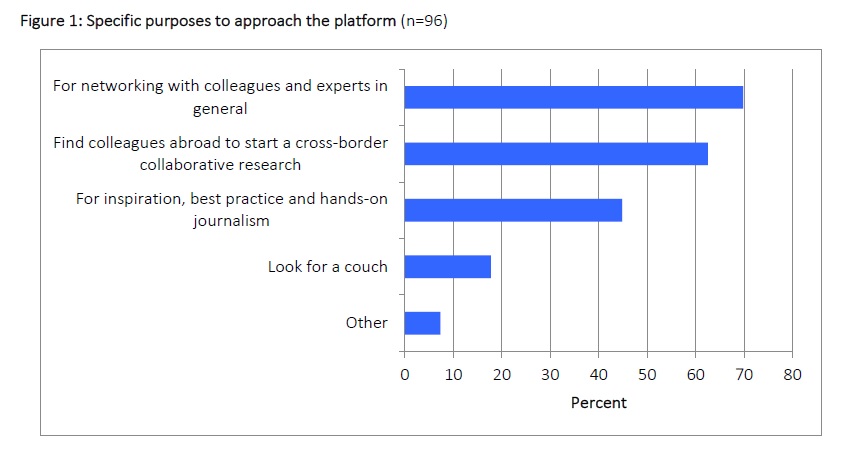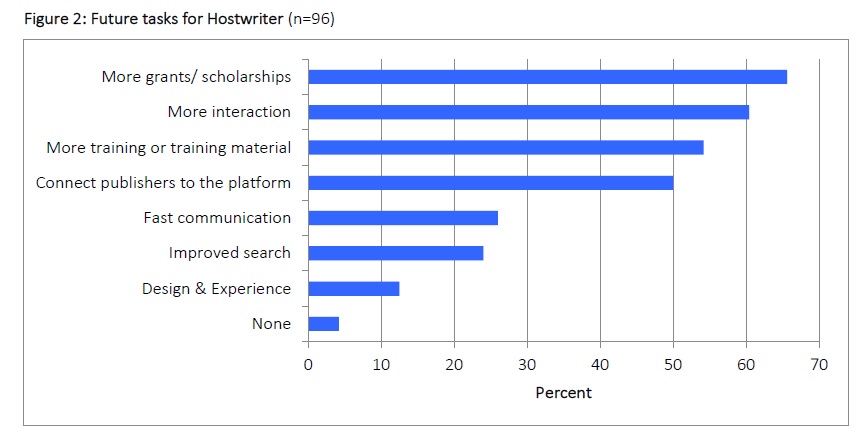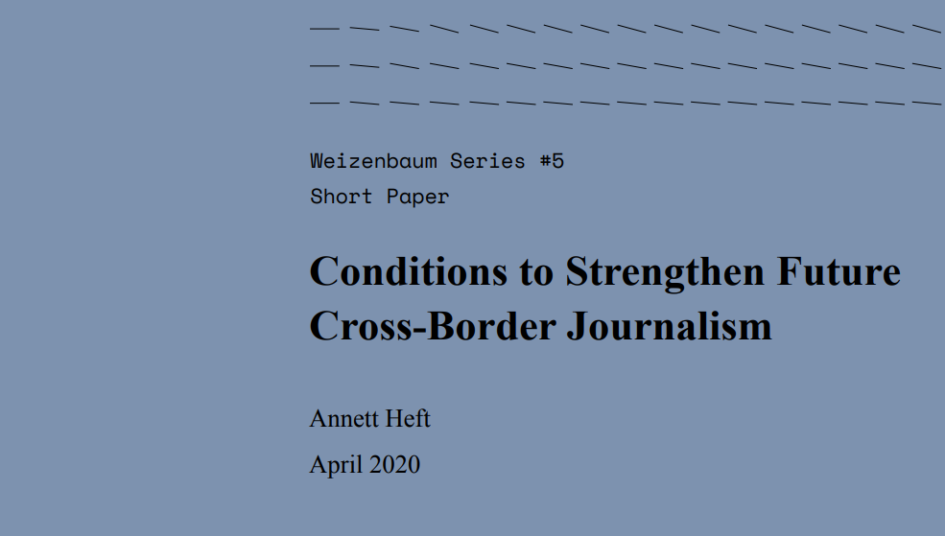The Weizenbaum Institute for the Networked Society and Freie Universität Berlin recently published a Short Paper entitled Conditions to Strengthen Future Cross-Border Journalism. In the study, Hostwriter and Dataharvest-EIJC were looked at as gateways for exploring how cross-border collaborations can be facilitated using a bottom-up approach – meaning that the journalists themselves initiate the collaborations.
The following guest blog post is by Dr. Annett Heft, head of the research group Digitalisation and the Transnational Public Sphere at the Weizenbaum Institute for the Networked Society, Berlin. Dr. Heft spearheaded the study.
Conditions to Strengthen Future Cross-Border Journalism
by Dr. Annett Heft, Weizenbaum Institute for the Networked Society and Freie Universität Berlin, Germany
Collaboration is one of the central future trends in journalism (Lewis 2016, Sambrook 2018). Especially journalistic collaboration across borders is an impressive practice that is becoming increasingly relevant. In the specific form of transnational journalistic research and investigation networks, journalists and/or media organizations from different countries join forces to investigate a common topic in a collaborative way (Alfter 2016, 2019; Heft et al. 2017). While large-scale examples of such collaborations such as the Panama Papers investigation led by the International Consortium of Investigative Journalists are widely known and had global effects (Graves/Shabbir 2019), we can observe many other cases where such cross-border research collaborations are practiced on a smaller scale but potentially as a more day-to-day routine.
In order to learn more about the conditions that are crucial to facilitate and sustainably practice cross-border journalistic research collaborations in the future, we asked journalists with interest in the method about their experiences and opinions. Our study had two starting points to approach practitioners with our questions: Hostwriter, as well as Dataharvest – the European Investigative Journalism Conference (Dataharvest-EIJC).
Hostwriter is a digital networking platform that helps journalists to collaborate across borders easily. Its overarching objective is to enable better reporting by facilitating cross border contacts between journalists worldwide. Therefore, the platform connects colleagues to seek journalistic collaboration and advice of various types. Networking events of the journalistic community are crucial to foster cross-border collaboration. Dataharvest-EIJC is one of the relevant networking events for investigative and data journalists in Europe. At this annual conference, journalists, data collectors, and other stakeholders from all over Europe network and generate ideas that often lead to collaborative projects. Both, Hostwriter and Dataharvest-EIJC have been established by pioneers from within the journalistic community to facilitate cross-border collaborations “from below,” (i.e., collaborations initiated by individual journalists beyond large media organizations and supporting infrastructures).
The basis for our exploratory insights is a standardized online survey that, amongst other dimensions, included questions on respondents’ experience with transnational collaborative projects and the future of cross-border collaboration. Sixty-five respondents answered our questions on the relevance and future conditions for cross-border journalistic work. Thus, the following results are not representative of all Hostwriter members or all Dataharvest-EIJC participants, but they provide valuable insights into the experiences with cross-border collaboration of this emerging community.
With respect to interviewees’ perception of the general relevance of cross-border collaboration, the answers show a clear trend: The majority of the respondents consider it very important. Over a third of the 65 respondents (35%) assessed the relevance of cross-border collaboration for their journalistic work in the future as extremely important, another third (35%) as very important. Only 7% of the interviewees stated that this practice is not essential for their future journalistic work.
When asked what conditions would be essential to facilitate cross-border journalism in the future, organizational and structural aspects were mentioned. The respondents agreed that the exchange of knowledge about cross-border methods (77% approval) as well as of knowledge about funding opportunities (66% approval) are of central significance. However, not only the mere knowledge of financing possibilities but also the actual funding (55% approval) are essential determinants for cross-border collaboration. As a further relevant requirement for transnational journalism collaborations, 45% of the respondents agreed that sensitizing publishers to the topic is an important task (Figure 1). Other aspects mentioned in this respect were the need for a multi-language platform and a cross-border infrastructure (i.e., meeting places), training, and especially the education of journalism students, as well as a “just do it” attitude.

In addition, we asked respondents what they consider critical contextual factors to practice cross-border journalism sustainably. Here, personal factors have proven to be particularly relevant. For the majority of the journalists surveyed, the most important prerequisite to sustainably practice cross-border journalism in the future is knowledge about differences in journalism cultures (78% approval). Likewise, trust between the journalists involved (77% approval) turned out as highly relevant for most respondents. Another factor is language skills (65%), which are also considered important for future cross-border collaborations (Figure 2). Apart from that, a way to publicly review the performance of international colleagues during collaborations (i.e., to advise them), a common platform like Hostwriter, decent payment (also during projects), interest in similar topics and openness of editors for a cross-cultural, multi-national journalistic perspective were highlighted as additional prerequisites.

These findings highlight essential aspects where existing platforms, practitioners, facilitators and funders, as well as anyone with interest in cross-border collaboration, can take action to enhance the practice of cross-border collaborative journalism further.
This blog post is an abridged version of the short report published under the same title in the Weizenbaum Series: Heft, A. (2020). Conditions to Strengthen Future Cross-Border Journalism. Weizenbaum Series, 5. Berlin: Weizenbaum Institute for the Networked Society – The German Internet Institute. https://doi.org/10.34669/wi.ws/5
References:
Alfter, B. (2016). “Cross-border collaborative journalism: Why journalists and scholars should talk about an emerging method.” Journal of Applied Journalism & Media Studies, 5(2), 297–311.
Alfter, B. (2019). Cross-Border Collaborative Journalism. A Step-By-Step Guide. London: Routledge.
Graves, L., & Shabbir, N. (2019). Gauging the Global Impacts of the “Panama Papers” Three Years Later. Oxford: Reuters Institute for the Study of Journalism.
Heft, A., Alfter, B., & Pfetsch, B. (2017). “Transnational journalism networks as drivers of Europeanisation.” Journalism, 1–20, Online first. https://doi.org/doi: 10.1177/1464884917707675.
Lewis, C. (2016). “The future of journalism in three words: collaboration, collaboration, collaboration.” Retrieved October 29, 2019, from Investigative Reporting Workshop, http://archive.investigativereportingworkshop.org/ilab/story/future-journalism-three-words-collaboration-collab/.
Sambrook, R. (2018). Global Teamwork. The Rise of Collaboration in Investigative Journalism. Oxford: Reuters Institute for the Study of Journalism.

